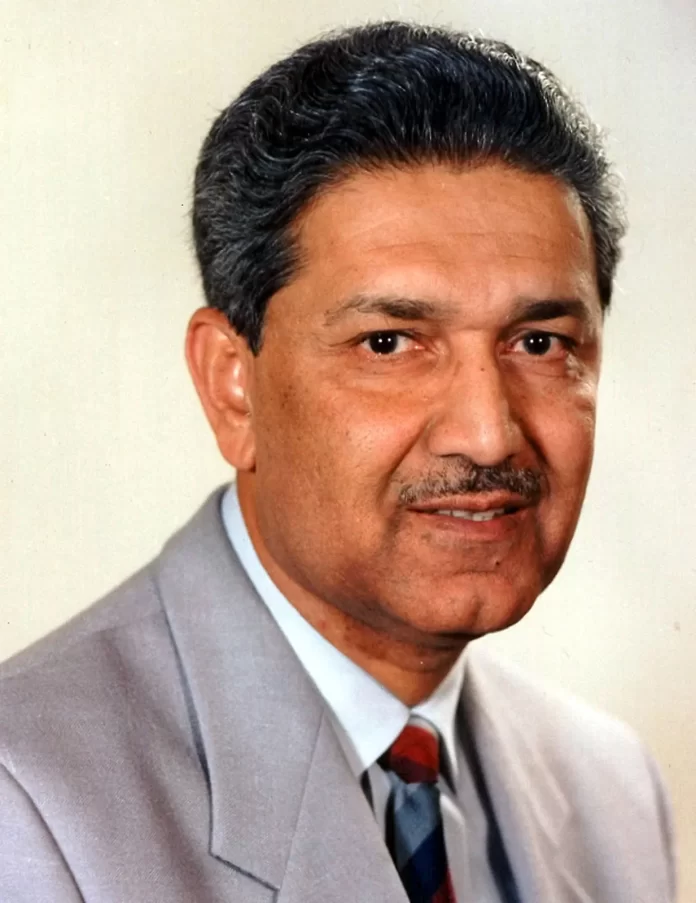Dr Abdul Qadeer Khan is hailed by the masses as a national hero and father of Pakistan’s nuclear bomb. He was born on April 27, 1936 at Bhopal in central India. From paternal side he belonged to the Turkish origin of Ghauri Tribe, who arrived in India in 12th Century A.D. while from maternal side his lineage belonged to the Mughals. His father Abdul Ghafoor Khan, who had graduated from Nagpur University in 1896, was one of the most respectable and honorable members of the community, and his mother Zulekha Begum was known as religious-minded woman. Some of his family members migrated to Pakistan immediately after independence but he migrated exactly after five years on August 15, 1952.
Abdul Qadeer Khan got his primary education in Ginnori Primary School and passed his Middle examination from Jehangiria Middle School. From Alexandria High School later named Hameedia High School, he got his matriculation. Later he got admission in D.J Sindh Government Science College, Karachi. From Karachi University he achieved his B.Sc. degree and the following year he succeeded in the competitive examination. He served as Inspector of Weights and Measures for three years but then he left for West Germany to get higher education. In Berlin he achieved high competence through attending several courses in metallurgical engineering. He obtained the degree of Master of Science (Technology) in 1967 from Delft University of Technology, Belgium and then earned a doctorate in metallurgy from the Catholic University of Leuven (Belgium) in 1972. He excelled as a metallurgist — an expert at building centrifuges — hollow metal tubes that spin very fast to enrich natural uranium in its rare U – 235 isotopes, which is an excellent bomb fuel.
No sooner had India declared their nuclear designs than Zulfiqar Ali Bhutto opted for the nuclear weapon even earlier than India went ahead for nuclear explosion on May 18, 1974. In a meeting of scientists hurriedly called on January 20, 1972, Bhutto urged the Pakistani scientists to carry out the task of ‘fission in three years’. The task was assigned to Pakistan Atomic Energy Commission. Dr A. Q. Khan at that time was studying in Holland. On September 17, 1974, while he was working for Anglo-Dutch-German nuclear engineering consortium Urenco, the Netherlands, he wrote a letter to Prime Minister Bhutto through Pakistan Ambassador in Belgium. He informed him about the nature of his job and offered his services with a suggestion for taking a shortcut of uranium enrichment. He met Bhutto in December 1974 and convinced him to manage nuclear deterrence for Pakistan.
A.Q. Khan initially worked with Pakistan Atomic Energy Commission (PAEC), headed by Munir Ahmad Khan, for a short period. But since he was not satisfied with this set-up, Bhutto gave A.Q. Khan in July 1976 autonomous control of the Kahuta Enrichment Project that had been already operative as Project-706 since 1974, two years prior to A.Q. Khan’s arrival in Pakistan. When Dr. A.Q. Khan joined, it was called Engineering Research Laboratories (ERL). However, on 01 May 1981, ERL was renamed through an order by Gen. Mohammad Zia-ul-Haq as Dr. A.Q. Khan Research Laboratories (KRL). On May 28, 1998, Pakistan successfully tested its first nuclear device and emerged as the only Muslim country to join the nuclear club.
The scientific contributions of Dr. A. Q. Khan have been recognized in several ways. As an active scientist and technologist, he has published more than 188 scientific research papers in international journals. Under his supervision, the process of Uranium enrichment was effectively accomplished and significant development was also made with the successful test firing of Intermediate Range Ballistic Missiles, Ghauri 1, in April 1998 and Ghauri II in April 1999. Dr Khan received honorary degrees of Doctor of Science from the University of Karachi in 1993, from Baqai Medical University in 1998, Doctor of Science from Hamdard University, Karachi in1999, and from the University of Engineering and Technology, Lahore in December 2000. For his contributions in the field of science and technology, Dr Khan was awarded Nishan-i-Imtiaz in 1996 and again in 1998. Thus he is the only Pakistani to have received twice the highest civil award. He is also a recipient of Hilal-i-Imtiaz During 1990s, there were reports in the Western media that Dr. A. Q. Khan had been involved in the sale of centrifuge parts to Libya and Iran. In November 2003, Pakistan was warned of possible nuclear leaks and according to an IAEA report, Dr. Khan was accused of having at the centre of an international proliferation network. Consequently he was retired from KRL and was appointed as Advisor to the President.
In the beginning Dr. Khan denied any kind of personal involvement in the nuclear proliferation. However on February 4, 2004 in a television appearance he took “full responsibility” for his action and seeked “pardon” from the nation. Since then he is in safe custody and no one is allowed to see him.
This article was last updated on Wednesday, Jan 06, 2010






